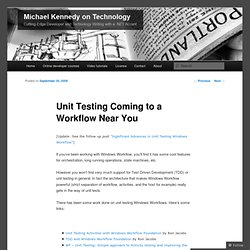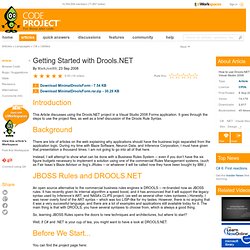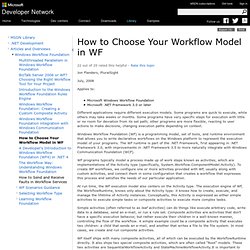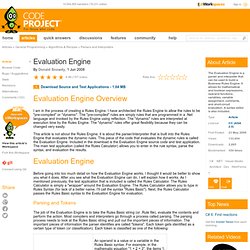

Michael C. Kennedy's Weblog - Unit Testing Coming to a Work. [Update: See the follow up post "Significant Advances in Unit Testing Windows Workflow"] If you’ve been working with Windows Workflow, you’ll find it has some cool features for orchestration, long running operations, state machines, etc.

However you won’t find very much support for Test Driven Development (TDD) or unit testing in general. In fact the architecture that makes Windows Workflow powerful (strict separation of workflow, activities, and the host for example) really gets in the way of unit tests. There has been some work done on unit testing Windows Workflows. Here’s some links: These are all very creative solutions. So until I get that finished, if you have any feedback or considerations on unit testing Windows Workflow I’d love to hear it. I think you’re going to like this… Like this: Like Loading... Getting Started with Drools.NET. Free source code and programmin. Introduction This Article discusses using the Drools.NET project in a Visual Studio 2008 Forms application.

It goes through the steps to use the project files, as well as a brief discussion of the Drools Rule Syntax. Background There are lots of articles on the web explaining why applications should have the business logic separated from the application logic. During my time with Blaze Software, Neuron Data, and Inference Corporation, I must have given that presentation a thousand times.
Instead, I will attempt to show what can be done with a Business Rules System -- even if you don’t have the six figure budgets necessary to implement a solution using one of the commercial Rules Management systems, (such as Fair Isaac’s Blaze Advisor or Ilog’s JRules -- or whatever it will be called now they have been bought by IBM.)
JBOSS Rules and DROOLS.NET An open source alternative to the commercial business rules engines is DROOLS -- re-branded now as JBOSS rules. Before We Start... Workflow Patterns. How to Choose Your Workflow Model in WF. Jon Flanders, PluralSight July, 2008 Applies to: Microsoft Windows Workflow Foundation Microsoft .NET Framework 3.0 or later Different applications require different execution models.

Some programs are quick to execute, while others may take weeks or months. Windows Workflow Foundation (WF) is a programming model, set of tools, and runtime environment that allows you to write declarative workflows on the Windows platform to represent the execution model of your programs. WF programs typically model a process made up of work steps known as activities, which are implementations of the Activity type (specifically, System.Workflow.ComponentModel.Activity). At run time, the WF execution model also centers on the Activity type. Simple activities (often referred to as leaf activities) can do things like execute arbitrary code, write data to a database, send an e-mail, or run a rule set. WF itself ships with many composite activities, all of which can be executed by the WorkflowRuntime directly. SimpleStateMachine - Home. Evaluation Engine. Free source code and programming help. Download Source and Test Applications - 1.04 MB Evaluation Engine Overview I am in the process of creating a Rules Engine.

I have architected the Rules Engine to allow the rules to be "pre-compiled" or "dynamic". The "pre-compiled" rules are simply rules that are programmed in a .Net language and invoked by the Rules Engine using reflection. The "dynamic" rules are interpreted at execution time by the Rules Engine. This article is not about the Rules Engine; it is about the parser/interpreter that is built into the Rules Engine that evaluates the dynamic rules. Evaluation Engine Before going into too much detail on how the Evaluation Engine works, I thought it would be better to show you what it does. Parsing and Tokens The job of the Evaluation Engine is to take the Rules Basic string (or .Rule file), evaluate the contents and perform the action. Let's work through an example of parsing and tokens. Here are the tokens that get identified in the above example: Examples Client Application.
Open Source Rule Engines in C#